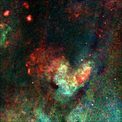Orion–Eridanus Superbubble
Appearance
Soft X-ray image of the Orion-Eridanus Superbubble with ROSAT.
The Orion-Eridanus superbubble in Hydrogen-alpha, with the Barnard's Loop and Eridanus Loop. Image covers the same area of the sky as the left image.
Part of the Orion-Eridanus Superbubble with ROSAT. The contours are 100 Mircon IRAS observations and show the shielding of soft x-rays by a filament.
The Orion–Eridanus Superbubble or Eridanus Soft X-ray Enhancement is a superbubble located west of the Orion Nebula. The region is formed from overlapping supernova remnants that may be associated with the Orion OB1 stellar association; the bubble is approximately 1200 ly across.[1] It is the nearest superbubble to the Local Bubble containing the Sun, with the respective shock fronts being about 500 ly apart.[1]
The structure was discovered from 21 cm radio observations by Carl Heiles and interstellar optical emission line observations by Reynolds and Ogden in the 1970s.[2]
See also
[edit]References
[edit]- ^ a b Aschenbach, B.; Hermann-Michael Hahn; Joachim Truemper (1998). The invisible sky: ROSAT and the age of X-ray astronomy. Springer. ISBN 978-0-387-94928-4.
- ^ Sanders, Robert. "Bursting bubbles in the galactic disk appear to be source of hot gas permeating the Milky Way galaxy and its halo". University of California Berkeley.



